Welcome! This article is my comprehensive guide on how to start studying the Bible. If you want to learn how to study the Bible for beginners, you’re in the right place! I come to you not as a pastor or Biblical expert, but as someone who has made this same journey myself. When I came to the Bible as a new believer, I had no clue what to make of it. Now I have a BA in Religion (with a focus in Biblical Studies) and a regular Bible study practice. I also read the Bible front to back last year. This guide has been updated in 2021 with new insights from that experience!
How to Start Bible Study: My Experience
I’ll be honest with you: I have’t always loved, or even liked, Bible study. Back before I knew how to start studying the Bible, I couldn’t tell Numbers from, well, a math textbook. I did my first Bible study online when I was 17, and I distinctly remember the teacher telling us to flip to Acts 2. “Acts in which book?” I thought, confused as everyone in the video dutifully opened their Bibles to the same page. It was like she told me to open to “verse 2” and I was expected to find it.
That’s right — I was so new to the Bible that thought an “Act” was the word for a verse. Now, 10 years later, and I have a degree in Religion with a focus on Biblical studies, and have written a few Bible studies myself. God sure does choose the strangest people.
This to say: if you’re new to all of this, I’ve been there.
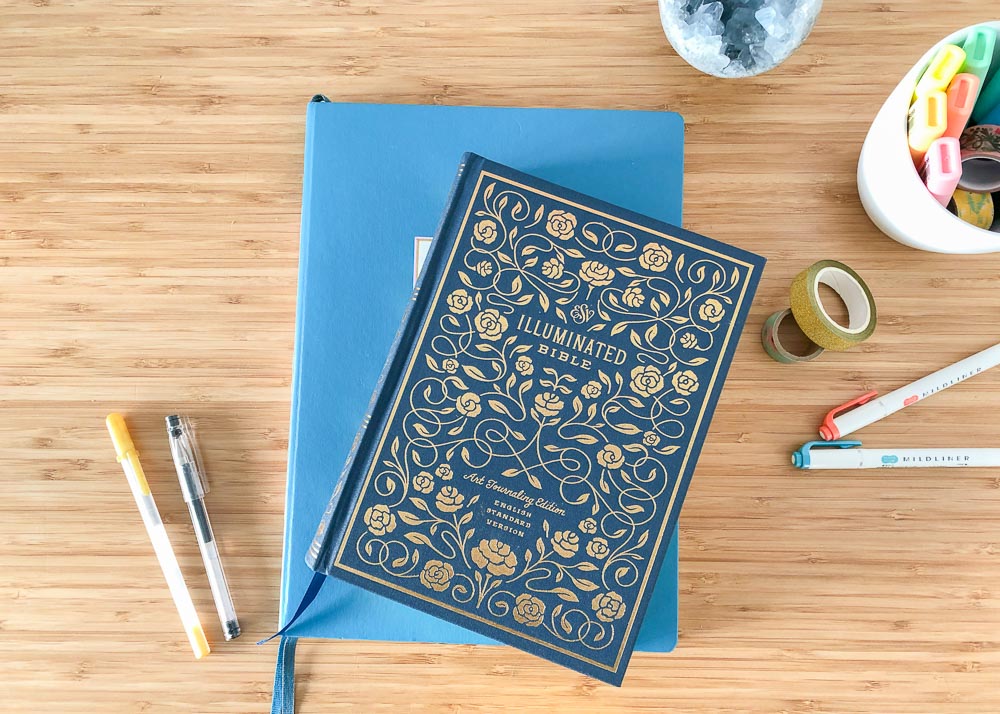
Whether you’re a new believer, a lifelong Christian who’s just starting to explore the Bible, or just looking because you’re curious, reading the Bible by yourself for the first time can be intimidating. I know how hard it is to find resources that explain what you need to know without overwhelming you. Or, worse, making you feel like you’ll never, ever get it. But you can, and you will. Today, I want to show you a few different Bible study methods that can help you learn how to start studying the Bible. But first, let’s lay down some basics.
How to Start Bible Study: What to Expect from Bible Reading
I heard this great anecdote from a YouTube video a few months ago. We often come to the Bible hoping or even expecting to get that amazing, awe-inspiring feeling of connection with God. But that moment is like going out to your favorite restaurant on your birthday — it’s exciting, memorable, and you look forward to it all year. By comparison, most of the time, our everyday meals are simple, unmemorable, or even boring. Our everyday meals may not stand out, but our bodies notice if we skipped them.
By the same vein, we may not have an incredible moment of connection with God every time that we open our Bibles. But we still benefit from the everyday moments of Bible study that may feel less memorable. Every time you open your Bible, you’re opening yourself up to a deeper connection with God. You’re nourishing your mind and soul. You’re strengthening your faith, even if it doesn’t feel like it. Just because you don’t feel much, don’t give up.
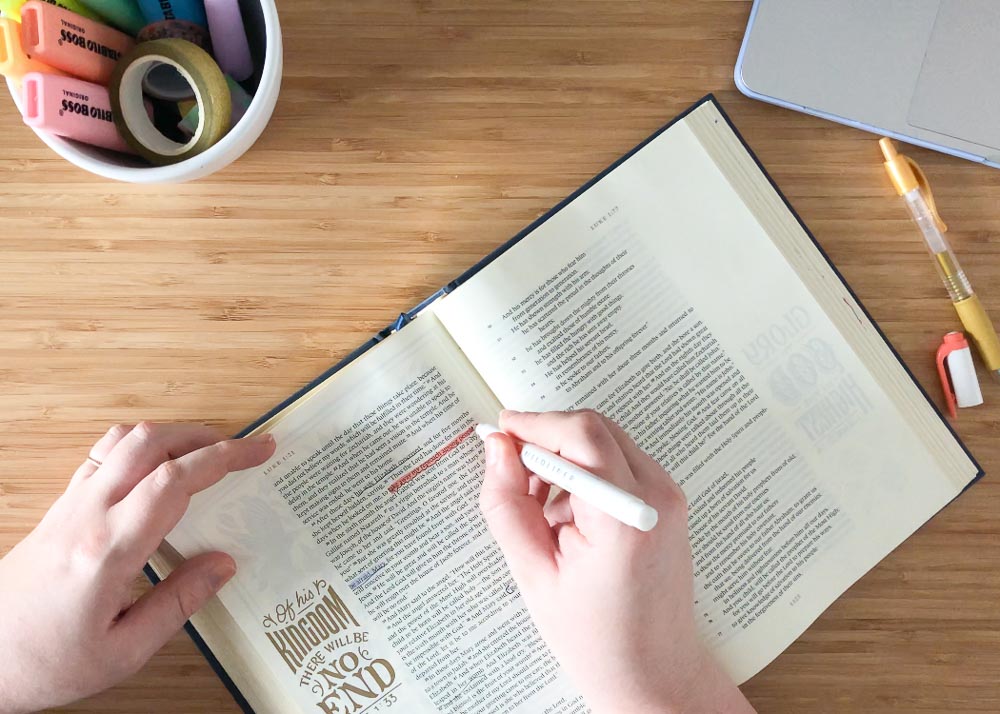
What to Expect From Yourself
And here’s another thing. If I had a dollar for every time I saw someone else’s Bible, marked-up with notes and bleeding with highlighter, and thought “WOW! I want THAT!”, I could buy myself a fancy commentary set or ten! To be sure, I love how encouraging it is to see other people’s Bible study photos and videos. But inspiration can turn to envy really quickly when we start comparing ourselves to others. (I especially notice this with Bible journaling.)
It can be damaging to hold yourself to the standard of someone else’s Bible study. This is especially true when you’re just learning how to start Bible study! Remember: this isn’t about having a “perfect” Bible or being a “perfect” person. God meets us where we are. We don’t have to climb the mountain or go to the temple to talk to God. We are blessed to serve a God who came to us. One who put on skin and sandals to walk in our shoes, feel our pain, know our hearts. We serve a God who stoops to meet us.
In the same way, you don’t need to mark up every inch of your Bible to spend time with God. You don’t need to read Hebrew or speak Greek. You can still gain important messages and lessons from the Word without tearing it apart. Focus on what you can do sustainably. If you can only spend five minutes a day, every day reading the Bible, that would be better than doing a huge two-hour study once a week. See what fits you, your life and your learning style. Do what you can.
How to Start Studying the Bible: Essential Resources
There are hundreds of commentaries and devotionals that can help you learn how to start Bible study. But fundamentally, all you need is a Bible. Even that can be easier said than done, though! Here are some of my tips.
Translations
The Bible has been translated in many different ways, and a lot of the translations have different styles and histories. There is not a single best choice. Not all of these are “better” or “worse” than another. Which one you use often is just a reflection of the community, family, or church you come from. That said, knowing which translations you like best may help you during your study, since you can look up different translations of the same passage if you’re confused.
Here are a few popular translations of the Bible in English. If English isn’t your first language, then try to find a translation you like in your native language!
This is kind of funny, but to help understand the relationship of these different translations, let’s talk about chocolate. Imagine that the original Biblical text in Hebrew, Greek, and Aramaic, is cacao powder — the purest essence of chocolate. If some of the common translations were chocolate — versions of that essence that are made edible for the modern person — they could be described like this:
Dark Chocolate — the closest you can get to the original language in English
NRSV (New Revised Standard Version) – This is a very close translation that is used by most academics and Bible scholars. If you ever want a study Bible or want to see the closest translation of the text, this is a good place to go, but some of the language can be hard to understand for newer readers.
Milk Chocolate — a close translation that is easily understandable for modern readers
ESV (English Standard Version) – A translation that tries to combine literal translation with being easy to understand in everyday modern English. This translation is common with mainline protestant communities.
NIV (New International Version) – A translation that tries to combine literal translation with being easy to understand in everyday modern English. This translation is common with evangelical communities.
HCSB (Holman Christian Standard Bible) – A translation that tries to combine literal translation with being easy to understand in everyday modern English. This translation is common with evangelical communities.
White Chocolate — a loose translation that emphasizes understanding over literalness
The Message (MSG) – This is a translation of the Bible that focuses on being understandable for a modern-day audience over being an exact translation of the text. This can be a great, easy-to-read supplement to your Bible reading to help you understand your verse in modern English.
Websites and Apps
If you need free resources as you navigate how to study the Bible for beginners, check out some of these. The following apps and websites are great free add-ons to your Bible study. They can help you gain more context or information from your reading.
BibleHub is a great resource that lets you look at a variety of translations of the same text side-by-side. They also pull up some notes from study Bibles and cross-references. If you scroll to the bottom of a page for a particular verse, you can find commentaries on it, but a lot of these commentaries are older and written in an old-fashioned style of English that may be hard to understand.
Logos is an iOS and Android app that lets you look up Biblical passages and commentaries. I personally love Logos for the sleek design and easy-to-use interface, but it has fewer free commentaries than some other apps.
Blue-Letter Bible is a popular website for Biblical commentaries. I personally find the website harder to navigate than some others, but appreciate how many commentaries they have freely available.
Physical Tools
This part is pretty simple. Use what you have and what makes the most sense for you. I like using the following tools as add-ons to my Bible study:
- A notebook or journal
- Pens and pencils
- Highlighters
- Post-its
Some people also like using stickers, stamps, washi tape, or other decorative elements to help them dig in. Whatever helps you get to it is what will be the best fit for you!
So with that said, let’s look at a few methods you can use to jump straight into studying your Bible.
Quick-Start Method for Bible Study
There are a ton of methods for how to study the Bible for beginners below. Ultimately though, the best one is the one that works for you. For many of us, that means a Bible study method that:
- Isn’t confusing
- Doesn’t overwhelm us
- Helps us understand and grow
If that’s what you’re looking for, this quick-start guide can help you.
Set a time. Set aside some time to read your Bible. If you’re just starting out, try for fifteen or twenty minutes. You can always build up to more.
Gather your materials. Grab your pens, pencils, highlighters, or notebook. Put your phone on silent. Get ready.
Pray. Gather your thoughts. Ask God to help you with your Bible study today.
Read. Read that day’s selected verse once, slowly. You can use a Bible study, Bible reading plan, or book you’re reading. I really like following the Bible Recap plan for reading the Bible in a year. It’s free and comes along with a podcast to help you understand!
Write down thoughts and questions. Now reread the passage and pay attention to what it’s saying. Is it telling you a fact, or setting up to tell a story? Is someone speaking? Who? Are there words or phrases that stand out to you as important, strange, or interesting? Write down your comments and questions, either in the Bible or in a separate notebook.
Optional: Look up the answers to your questions using Google or a commentary.
For some people, the notes they take on who’s speaking and what they’re saying is enough. But others want to learn more, and if you do, the resources above in the Websites and Apps section will help you learn more. Look up the passage you’re reading in one of the commentaries, or Google a phrase that interested you with the passage next to it (Like this: “A city built on a hill Matthew 5:14”). Remember that what you find may be helpful, but it’s not always definitive — not everyone giving advice on the Internet is right. Find the sources you trust, and see what they have to say that can help you.
Reflect. When you’ve worked through the passage, put down your pen or highlighter and reflect on what you’ve learned. What does this passage teach you about God or yourself, if anything? How could you act its message out in your day-to-day life? See if you can summarize what you learned in 1-2 sentences. You may also choose to turn to God and say a prayer of gratitude for what you learned, or ask for guidance in helping to understand the passage.
How to Study the Bible for Beginners: Other Methods for Bible Study
This is a foundational method for Bible study, but there are many others that could be helpful for you. Don’t be afraid to try one of these each day on that day’s passage to see what you learn.
Bible Verse Mapping
If you’re a visual learner, Bible verse mapping may be right for you. The basic idea is taking a single verse of the Bible and breaking it down visually. There are different ways to do this; here are a few examples from my experience and from the internet. You can read about more of them here.
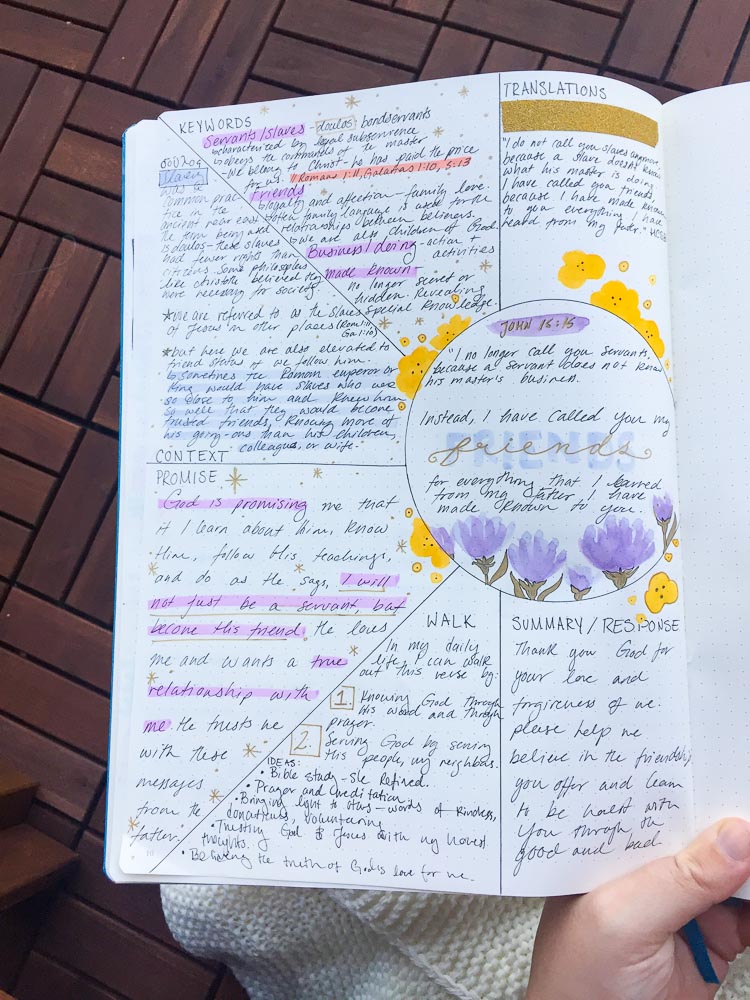
Sunbeam Map
Trace a circle into your journal and write your verse inside it. Now, using a ruler, make different sections around it on the page. The different sections can be whatever you find most useful, but I like using these:
- Translations — other translations of the same verse where some keywords may be different.
- Keywords — words that stood out to me and what they mean.
- Context/History — information about where in the story of the Bible this takes place, or about the historical context of this time period (Logos is a great resource for this kind of information).
- Promise/Lesson — What is God promising me here? What does this verse teach me about God, Jesus, or myself?
- Walk — How can I walk out the message of this verse in my daily life?
- Summary/Response — What did I learn from this passage? What do I pray God will teach me about this passage?
SOAP Bible Study Method and Other Acronyms
There are so many of these amazing acronyms to help you with your Bible study. The one I’ve seen most often is SOAP (Scripture, Observation, Application, and Prayer), but there are dozens of others that you can try. I don’t personally use one of these methods right now, so I’m not the right person to guide you through them, but this guide is a thorough walk-through of 11 of these methods.
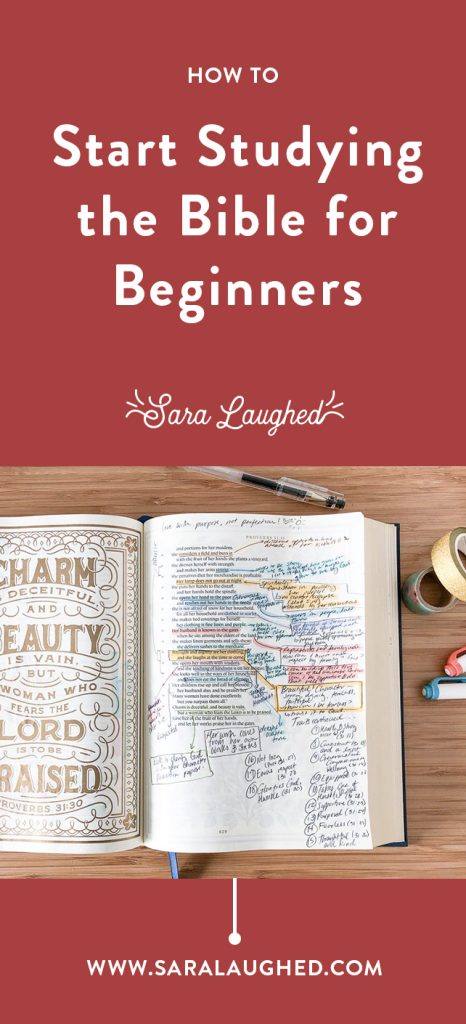
Digging In: How I Personally Study the Bible
This is the method I use when I really want to go all-out and learn as much as I can from my Bible. For this, I’m essentially using the Quick-Start Method but adding multiple layers of research and study.
First, I read through the passage slowly, underlining interesting phrases, putting boxes or circles around major keywords, and adding squiggly lines under things that confuse me or that I find curious.
Then I slowly go through the passage, looking up every keyword, sentence, or phrase using my Logos app and sermons that I find online.
Next, I take notes in the margins and box them off, with arrows pointing from the section of scripture to my notes.
I imagine if I were the one writing this story, in a bare-bones way. Are there things the Biblical text is telling me that I wouldn’t add myself, if I were just relaying the story? If so, those things are probably important.
Example: How to Start Bible Study
One example is John 4:1-2: “Jesus knew the Pharisees had heard that he was baptizing and making more disciples than John (though Jesus himself didn’t baptize them—his disciples did).”
If I was relaying the basic story, I would have just said “Jesus knew that the Pharisees had heard he was baptizing and making more disciples than John.” The fact that the author adds “though Jesus himself didn’t baptize them” means that there’s something important there.
I did some Googling/research and it turns out that that’s actually a really important note! It seems like Jesus didn’t perform water baptisms so that no Christian could lord their status over another, because we are all of equal status in Christ (Galatians 3:28). By paying attention to what stands out, I’m able to notice little details that I wouldn’t if I just looked at the big picture.
Note big theological concepts
I also note “big ideas” that stand out to me theologically.
For example, many Jewish people walked around Samaria because of their disdain for Samaritans, so when the Bible says that Jesus “had to walk through Samaria,” it doesn’t mean geographically — maybe it’s because he knew he had to meet the Samaritan woman to give her this new beginning.
So what that teaches me is that God will out of His way, into the darkest places, to meet people and offer them rebirth.
Note-taking
Then I highlight the scripture portion, arrow, and box of notes all in the same color so I can stay organized. I don’t color-code for the most part (my one exception is that I always use the same shade of orange to note cross-references, when one voice references another). This is so that I don’t become beholden to my own system, and instead let the focus of my study be on learning and not following my own color-coding guide.
After I finish a page or reading section, I write my personal takeaway on a post-it note. Usually it’s a lesson I can apply to my life or something to remember that I learned about God that day.
What I learned from reading the Bible in a year
Since reading the Bible in its entirety in 2021, I’ve found a new rhythm for Bible study. I’m now much more comfortable picking up the text every day. Sometimes I use a commentary or guide alongside. I pray, I read, and then I reflect in the margins or on a post-it.
What I love about writing in my Bible as I learn is that the text becomes like a conversation between me and God, where I can record my thoughts and questions, and where God is speaking to me in my life and learnings. The physical Bible becomes a record of my spiritual growth, as well.
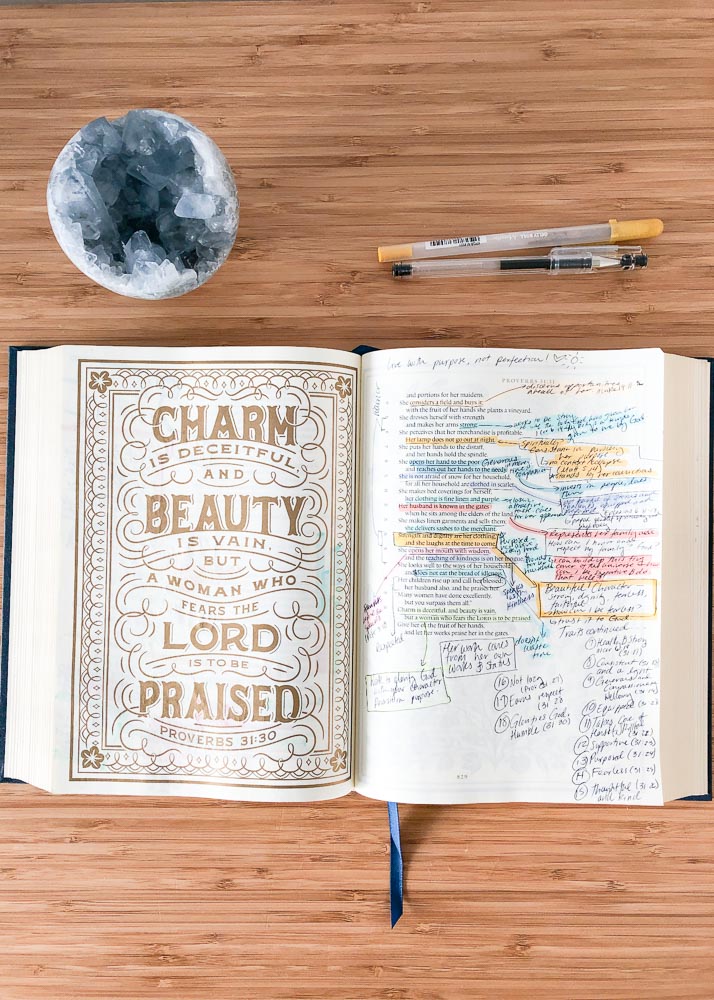
How do you study the Bible?
That’s all I’ve got for now. I hope that these methods will guide others in how to study the Bible for beginners out there. May it inspire you to find what works best for you in your own Bible study. Thank you for taking the time to read this guide to how to start studying the Bible. If you have any questions or comments, please don’t hesitate to comment below. Let me know: how do you do your Bible study?


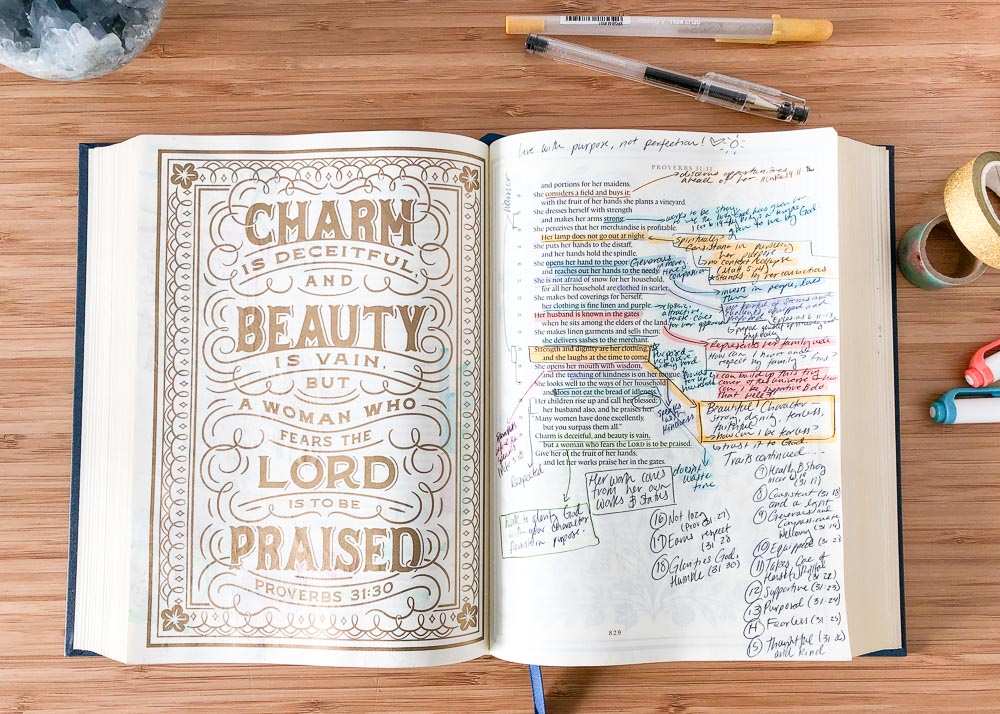
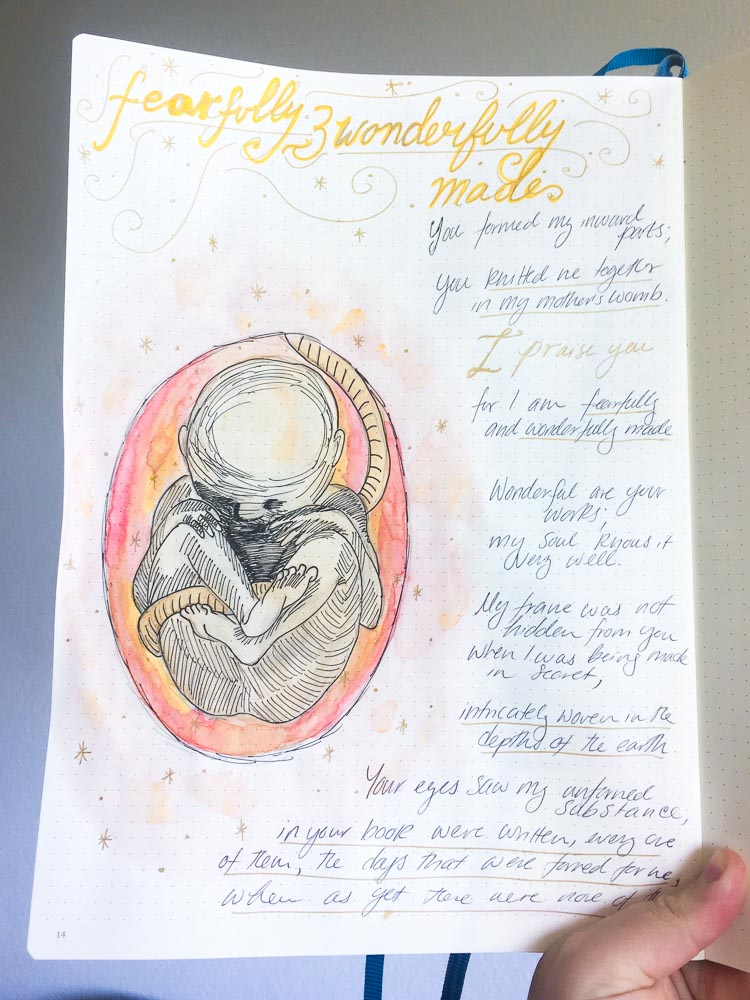
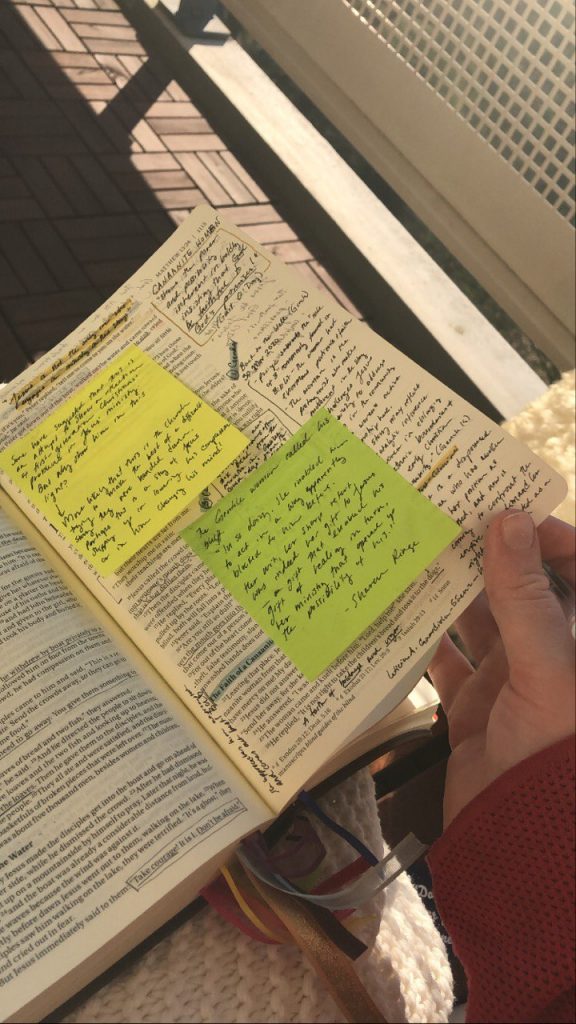
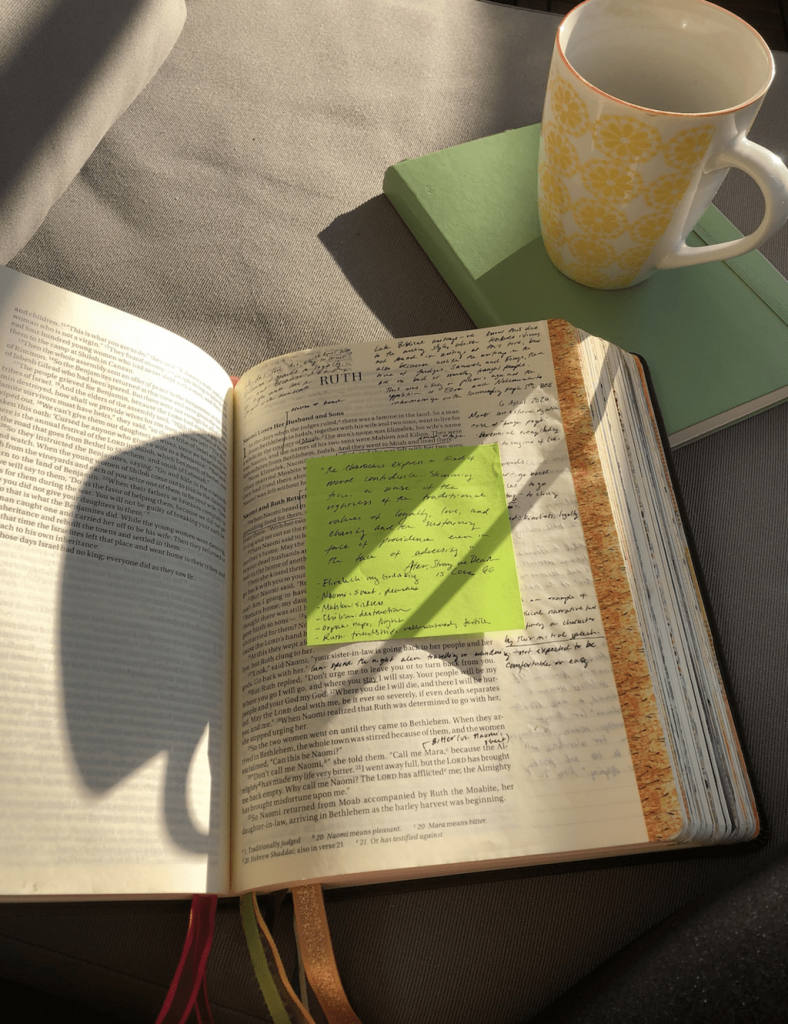
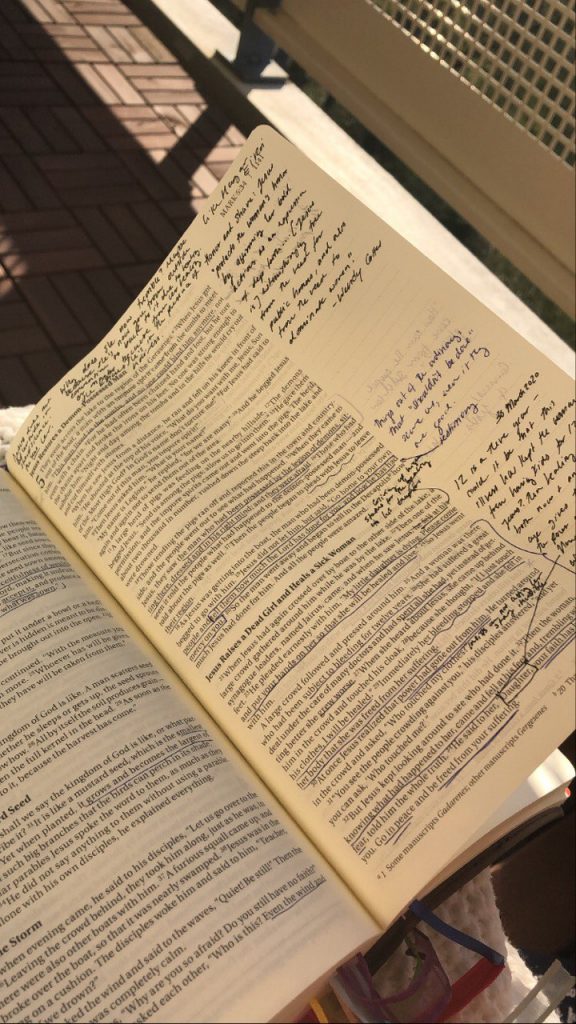


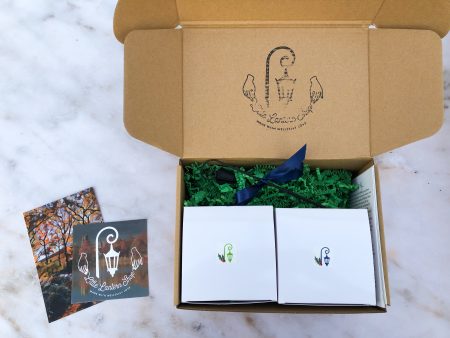
I guess my 1st real question is, where do you start? How do you know what page, act, verse, book to start reading? For example if I’m wanting to dig into a subject, or something I’m concerned about how do I know where to open my bible up to? I want to dig into my bible but I don’t feel like I have any direction what so ever and I feel like I need a path.
Tanya,
If I’m not sure where to start reading I’ll ask God to show me what He wants me to learn during my time with Him. Sometimes I’ll hear a book and other times I’ll be flipping through my Bible and feel a tug at my heart instead of hearing words spoken. Today I heard the words “Return to Me” so I used Biblehub to see what verses contained those words, you can use Google too. God’s language is Hebrew so don’t forget to look up what words mean in Hebrew. It opens up so many variations. I hope this helps you in your journey 🙂
I am trying to figure out where to start in my Bible..
What I’m really looking for is a bible study that will start from genesis through revelations.
It’s good to start with any of the Gospel Books. The entire Bible talks about Jesus, so it’s better to start studying the books that tell about His life, death, and resurrection, and make sense from it all.
I actually looked up the bible in chronological order since I come at it from a reader/writer standpoint. I have to have or be able to create a road map. I am now reading in chronological order and I’m loving it. Things are making a lot more sense. Hope this helps. 🙂
I’m doing this too and I’m starting to realize that every event in the Bible from the creation story to the promise of a second coming are all interconnected.
I’m looking up I want to know where do I start first to read the Bible I really want to learn God’s word
I’m looking up I want to know where do I start first to read the Bible I really want to learn God’s word
Thank
You for writing this article. I found it inspiring and helpful. I’m excited to get started.
Hi Sara, I just want to thank you for your blog post. I am a returning Christian who fell out of faith and backslid as I was growing into an adult. At the age of 29, I got baptized and I am 31 today. Since I have started my walk with Christ, studying the bible has been a challenge. I took a lot away from this post and you have clarified, for me, how to use the verse mapping technique. Thank you so much. I am feeling optimistic about studying my bible.
I really connected with you and felt as though God led me to your blog (via Pinterest). I have been a believer most of my life but not even close to being a bible scholar—but now I know that’s okay! God will meet me where I’m at… the beginning. I am ready to start studying the Bible like I’ve always wanted to. You’ve given some great tips I plan to use. Thank you!! God bless.
what do you do about bleeding ink and marker through the pages?
I bought a set of highlighters that are designed for the kind of paper used in bibles. I got the set of 6 at Barnes and Noble. They will bleed through if you go over the same spot over and over but other than that, they are perfect.
That’s great, Cassady! They sound ideal.
Something that helped me was using gel highlighters.
Thank you soooo much this was soooo helpful to me !!
Love this post. Exactly what I was looking for! Is the -not having a color code for highlights- a personal thing or did you learn this from Jordan lees boot camp? I’m waiting for the next class but want to start now but not sure how she color codes. Thanks
Hey Rae! I’ve done a few sessions from Jordan’s bootcamp and I believe she also doesn’t have a system for which colors she uses. I don’t think I got that technique from her (I was never very good at following color code guides and just abandoned them after trying a few times!) but if I remember correctly, she doesn’t use a code either (:
I have been a Christian for about 30 years. Gods word never fails to teach me, inspire me and helps me feel closer to Him. My mom and dad have finally excepted Jesus as their savior. Now they look to me for guidance in studding the bible. They are in their 80’s and find the bible confusing sometimes. Thank you for sharing the tools you use to study the bible, I am going to share them with my family.
THANKS FOR THIS.. IT WAS INSPIRING HOWEVER, CAN I ORDER A BIBLE THAT GUIDES IN THIS WAY. CAN YOU INSTRUCT ME….MARIE
Marie,
You can buy Bibles that help you to read it in a year. Most of these give you a chapter or two to read in…say Genesis, then add a Chapter of Psalms and maybe a chapter from the New Testament. Hope this helps.
Laura
Thank you so much for sharing this. I’m looking into mentoring someone, well actually bringing them into the family of Christ and needed some structure and ideas. I like very much what you suggested. I now need to see in what part of the Bible I should start with her little by little.
I enjoyed your methods for studying the Bible. Please let your readers know “Where is the best place in the Bible to begin study “. Thanks!
I’ve been wondering for awhile how people DO study the Word. Queried FB last yr with various results. I hope to open uo an on-going say 6 month class at my church. Helpful post. TY
I used to be devout and knew the ins and out of my bible before i completed high school(well I thought I did). I lost my way as i grew older and I’d really like to find it back. It has taken so many failed attempts but this time I’m going to do it right. Focus on myself and my journey with God and only God. In my past attempts i found myself comparing my process with others and that was so wrong of me and it set me back. I’m so sorry to God that it took me so long to come around again…about 3 years. I sincerely pray and hope with all my heart that He holds my hand as I start my journey afresh.
Same here sister! We’re in this together. Praying for you <3
Thank you Sara for this wonderful post! I often feel embarrassed because I don’t always have this hunger to read the word, and I know how important knowing scripture is.. and sometimes I find it hard to comprehend what I am reading.
Your article really helped me, and I’m going to apply your suggestions to my Bible studying. Many Blessings and gratitude
Lea
Great tips. Thank you!
Sara im new to studying the bible and i have learning disabilities so i get overwhelmed and afraid that i wont understand so i dont do it. But where is a good place to start. The color coding and notes is what throws me i dont know where to get the notes and how to color code thanks Stacey
I’m just getting started and found your blog VERY helpful!
Hi, Sara I enjoyed reading your story of how you began your bible study journey, it was very in lightened, and helped. Thank you for your time in preparing this guide🙏🏽
Great tips and ideas for starting to dive in to God’s word for deeper meaning and a closer walk with Him.
Wow! This is just amazing. Thank you so much. God definitely lead me to your blog.
Wonderful activities God bless you and your family . God bless you
Hi there Sara!
Just wanted to say, your comparison of the translations and chocolate was such a great way to communicate the differences!
Blessings 💕 and thanks for the inspiring posts, I’m definitely going to check out BibleRecap!
Thanks a million for the pattern. I will start immediately.
You did a great job with your guidance on how to study our Bibles. I will pass this on to others. Thank you
This blog is so helpful! I love the Sunbeam Map for studying a verse. I just wanted to add a possible method for taking notes that I have personally enjoyed using. It’s Cornell notes. There are many Youtube videos describing how to use Cornell notes. I like to use them when listening to sermons. Thanks again for your blog!
Thank you for sharing such wonderful information on studying the Bible. Wanted to let you know the link under Bible Mapping took me to an incorrect site.
Thank you. I have used this heavily to start my journey